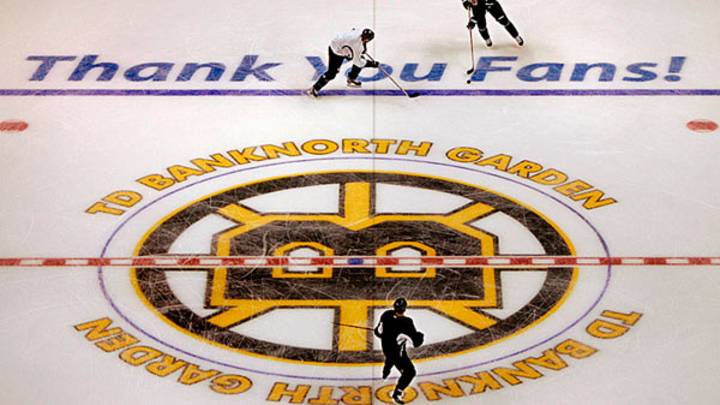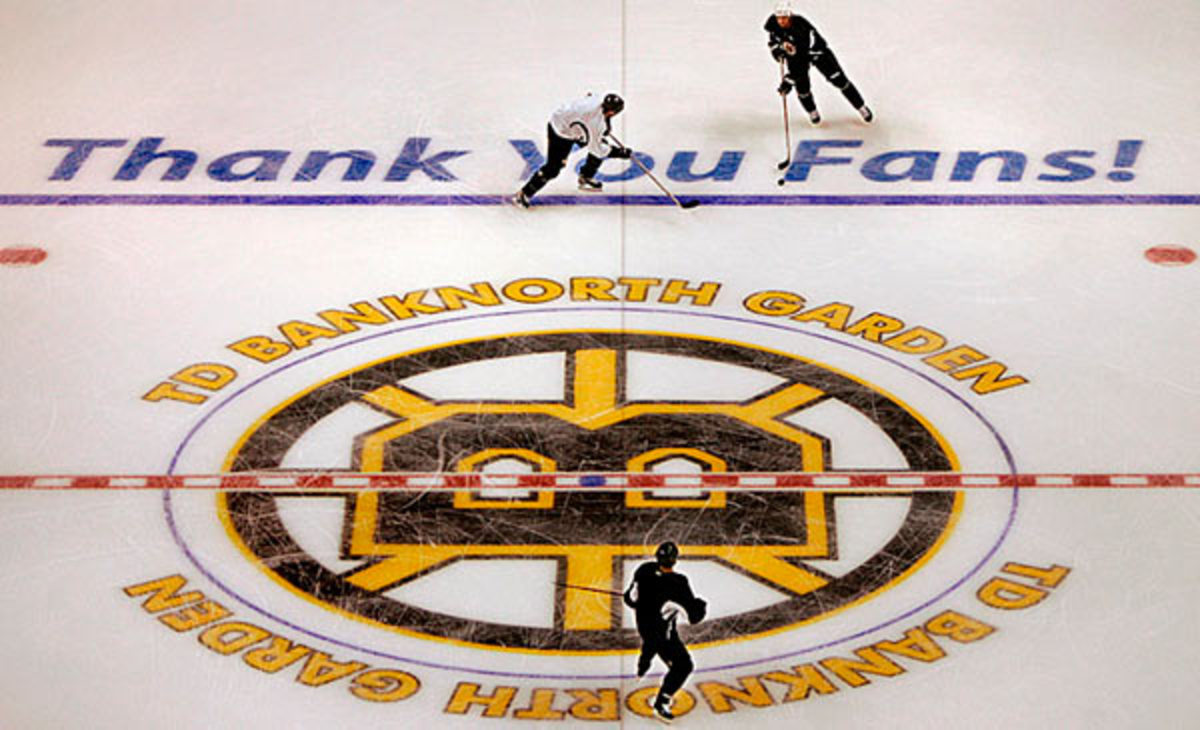Does the NHL's CBA notice mean another lockout?

After its last lockout in 2004-05, the NHL had to work to smooth things over with its paying customers. (Charles Krupa/AP Photos)

By Stu Hackel
You probably don't want to read this any more than I want to write it, but the momentum of the Stanley Cup playoffs hit a speed bump on Wednesday when word got out that the NHL had formally notified the NHLPA that it intends to change and/or end the current collective bargaining agreement. If the worst-case scenario results, if the owners eventually decide to lock out the players next fall, this formal notification will go down as the first shot in hockey's next labor war.
Just what another lockout would do to the NHL, its relationship with its fans and business partners -- not to mention the players -- can only be speculated upon. But no one needs to consult ancient hockey history books to recall what the lockout of 2004-05 did and the extent to which the league had to go to repair the damage. How well the NHL eventually rebounded is a great tribute to everyone connected with the game, but squandering all gain just seven years later and plunging us into darkness again greatly risks a different outcome this time.
It's far from a sure thing how the game's labor relations will play out. The two sides have yet to begin negotiating the new agreement, but the owners are obligated under the terms of the current CBA to notify the players 120 days before its expiration if they want to make changes or terminate it. No one is exactly sure what the owners want to change or how difficult it will be to achieve their desires through negotiation.
But this much is clear: The overall economic health of the NHL can hardly be an issue, with the league projecting record revenues of $3.2 billion by the end of the playoffs, an increase of 18 percent in a flat economy that was achieved under the model the league locked out the players in order to implement. Since the last lockout ended, the NHL's revenue has nearly tripled. If, as some believe, the owners will seek a larger share of that revenue than they currently pull in, that could very well cause problems next September when the current CBA expires.
According to Liz Mullen of Sports Business Daily, the NHLPA had no problems with the current agreement and had no intention of notifying the league it wanted changes, so this is being done unilaterally by ownership.
This current CBA ended the lockout, the second in NHL history, that cancelled the entire 2004-05 season. The main issue was the imposition of the salary cap by ownership, to which the players capitulated after losing the season. The fact that the NHLPA did not wish to change the current agreement means that the players under Donald Fehr — who always fought against the cap when he headed Major League Baseball's players union and advised the NHLPA against agreeing to one — now feels players can live with it in its current form. There's good reason for that: the salary cap rose from $39 million in 2005-06 to $64.3 million this season, so the players are doing as well as the owners. That is how the system of owner-player partnership was envisioned to work.
There has been widespread speculation over the last year that the owners' proposals could include matters as relatively small as allowing clubs to buy their way out of a bad contract without having it count against the cap, and as large as the share of revenue the players receive from the NHL-NHLPA partnership.
Prior to the lockout, the league claimed that player salaries ate up as much as 75 percent of revenues. Since the lockout, they've been fixed at around 57 percent. Within the last year, NFL owners locked out the players, who eventually accepted 48 to 49.5 per cent of revenues. NBA players lost nearly half a season before agreeing to a 50-50 split.
Don Fehr’s brother Steve, an outside counsel for the NHLPA, told Mullen earlier this week that the players will not agree to any further reduction of their share, saying, “I think it is fair to say that if the approach is what many are predicting, that the owners come in and say we have to shave 5, 10, 15, 25, 30 – pick a number – points off the percentage of revenues in the cap that players receive, there may be a lot of players who say: ‘Wait a minute, we already gave at the office.’
“We made massive concessions last time that were designed to fix your so-called problems. If it has not fixed your so-called problems, we need to have a long, hard discussion about what those problems are and what we should do about it.”
Steve Fehr added that he did not know if NHL owners would mimic their counterparts in the NBA and NFL by asking players to take a reduced cut, or if they would follow the route of MLB owners, who did not seek major economic concessions and reached a labor deal without a lockout last year.
“If, on the other hand, there is more of an approach that was taken by MLB, it may be a quick and easy negotiation,” Fehr said. “That is actually what Gary Bettman has said, that he expects a quick and easy negotiation and he probably knows more about it than I do, so perhaps that is the direction it will take.”
Back in November, we examined the thoughts of Forbes magazine's Michael Ozanian, who believed that the owners would push for a larger share of revenue in these negotiations. Ozanian stated that while franchise values have risen around 47 percent since the lockout, too many clubs still lose money. “The NHL must move much closer to the 48 percent model the NFL agreed to before this season or the 50-50 revenue split National Basketball Association’s owners and players recently agreed to," he wrote.
But Ozanian doesn't consider that, unlike those leagues, NHL owners do not share enough of their own record-breaking revenue among themselves to offset the problem. The NFL and the NBA owners share a good deal of their revenue. As we wrote back in November, "Under current NHL revenue sharing rules, clubs in bigger TV markets (more than 2.5 million TV households) cannot receive any assistance from the league whatsoever, nor can any of the top 15 revenue-earning teams. So if Forbes’ figures are correct, at least seven teams that lost money last year do not qualify for any revenue sharing money under the current CBA. They include the Islanders, Devils, Ducks, Kings, Sharks and Stars, who are in big TV markets that make them ineligible. And the Wild, who supposedly lost money but are not in the bottom 15 revenue producing teams, can’t get any help either."
If Ozanian is right and the owners want to shift the inequities of their own revenue generating machinery onto the players without first making changes to those rules, that could cause some serious problems.
If Renaud Lavoie of RDS is right, someone is already planning for a work stoppage. He blogged on Wednesday that, "From what I understand, the worst case scenario would be: start the season later than January 1 or for the Winter Classic to be held at the stadium in Michigan, between the Leafs and Red Wings."
Ugh.
The first NHL lockout, in 1994, came at a very interesting time: after the Rangers' first Stanley Cup championship in 54 years and the first full season of Gary Bettman's reign as commissioner. The league had begun making some big strides in public perception after a 15-year period in which it had fallen far behind the NBA in popularity. Bettman had begun revamping the league's business footing and the games had returned to network TV for the first time in almost 20 years. The moment is remembered for the provocative Sports Illustrated cover in June 1994 that proclaimed, "Why the NHL's hot and the NBA's not" (and the story that stated the case). That September, all the momentum generated by the NHL the previous spring vanished when the season didn't start, and it has taken since that time to return to the previous plateau.
During that lockout and the one that followed 10 years later, the NHL claimed that the settlement would fix its broken business. That certainly wasn’t true in 1995, after which salaries skyrocketed as owners could not control their spending. The league claimed by 2004 that 75 percent of revenue went to player contracts. The institution of a salary cap, accompanied by a 24 percent pay slash was designed to achieve cost certainty for the owners and allow the business to grow. Well, they were right. It has.
In the pre-Bettman era, the conservative NHL was said to operate by the motto, "If it ain't broke, don't fix it." Now one wonders if the new motto might become, "If it ain't broke, break it."
Now here's Fontella a few decades later, reprising her role on British TV, but this time, instead of Bobby McClure, her foil is Lyle Lovett.
Good songs never die, and here's the most recent version by the very talented Bostonian Eli "Paperboy' Reed and the great vocal trio from Girona, Spain, the Pepper Pots.
COMMENTING GUIDELINES: We encourage engaging, diverse and meaningful commentary and hope you will join the discussion. We also encourage, but do not require, that you use your real name. Please keep comments on-topic and relevant to the original post. To foster healthy discussion, we will review all comments BEFORE they are posted. We expect a basic level of civility toward each other and the subjects of this blog. Disagreements are fine, but mutual respect is a must. Comments will not be approved if they contain profanity (including the use of abbreviations and punctuation marks instead of letters); any abusive language or personal attacks including insults, name-calling, threats, harassment, libel and slander; hateful, racist, sexist, religious or ethnically offensive language; or efforts to promote commercial products or solicitations of any kind, including links that drive traffic to your own website. Flagrant or repeat offenders run the risk of being banned from commenting.
